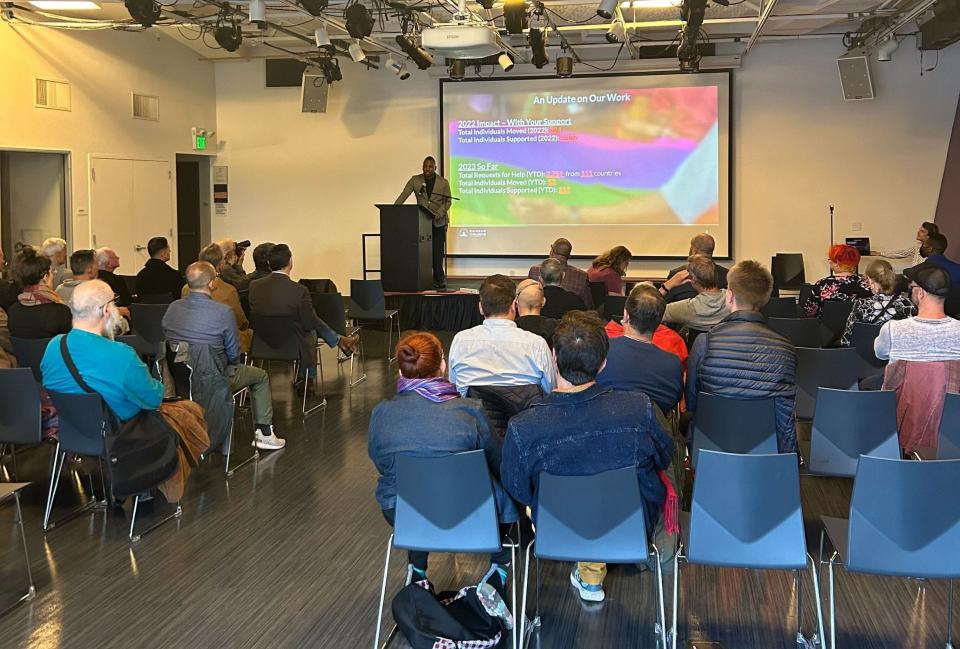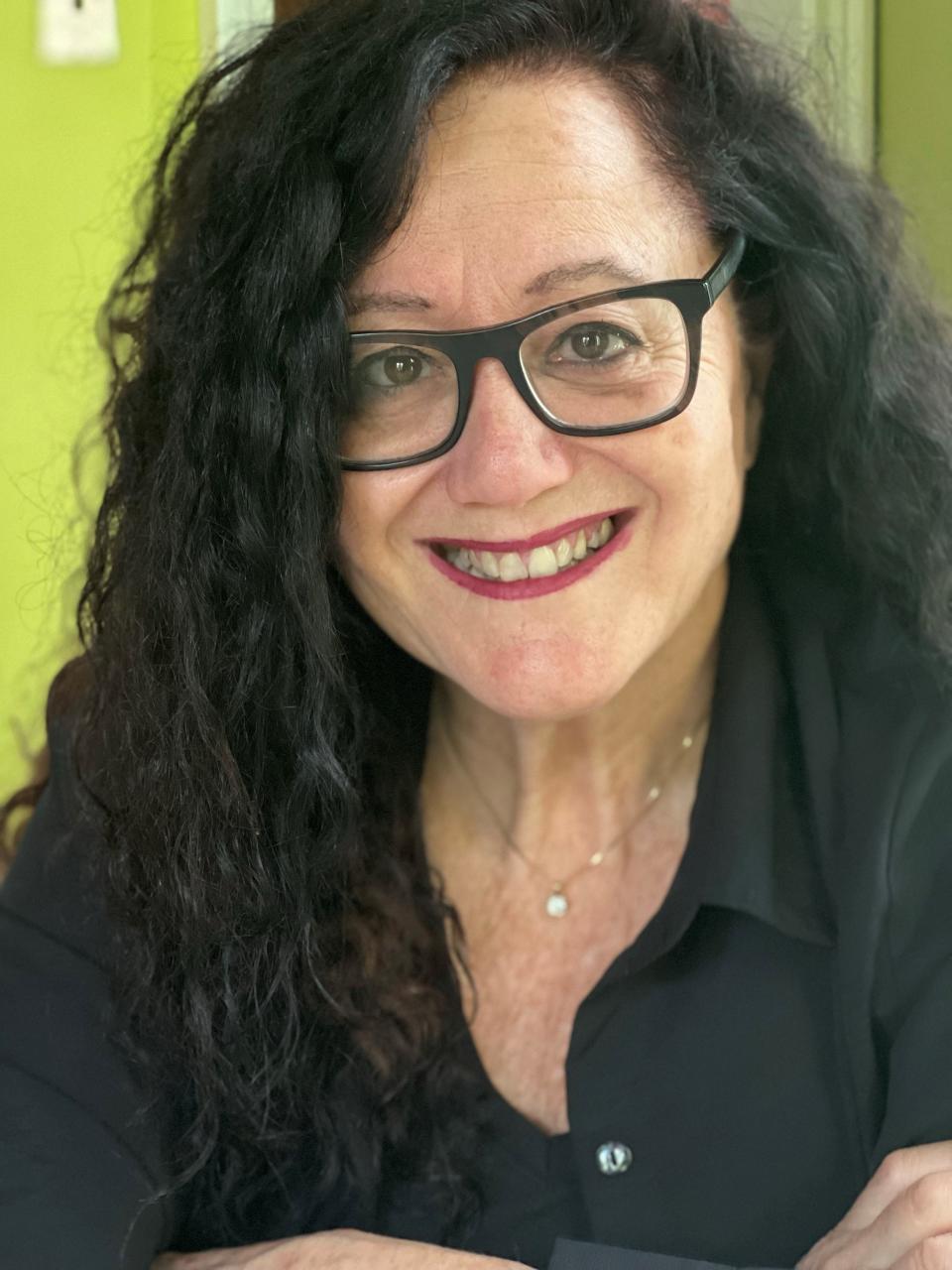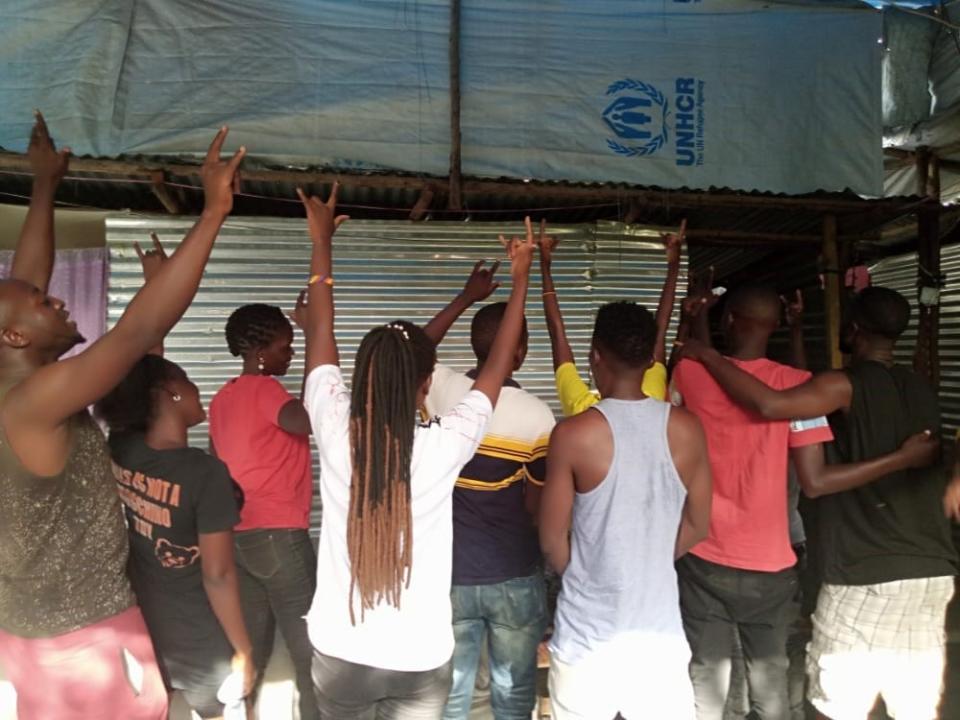OPINION: Homosexuality in Uganda is now punishable by death. LGBTQ+ Ugandans need help
- Oops!Something went wrong.Please try again later.
“They are going to start killing us,” Henry Mukiibi, an LGBTQ+ activist and founder of Uganda’s Children of the Sun Foundation, told me Monday.
Mukiibi is afraid because Ugandan President Yoweri Museveni signed the Anti-Homosexuality Act, 2023,into law that day.
The bill — to which minor revisions were made at Museveni’s request in April — still mandates these harsh sentences: the death penalty to those convicted of committing “aggravated homosexuality”; life in prison if convicted of “committing the offence of homosexuality” and up to 10 years for an “attempt”; up to three years for a child (under 18) convicted of one of the above; up to 10 years for those convicted of marrying someone of the same sex or facilitating a same-sex marriage; and up to seven years for anyone, such as landlords, convicted of knowingly allowing premises to be used for “acts of homosexuality.”
Even before the bill's enactment, LGBTQ+ Ugandans faced beatings, evictions, and mob violence, as Mukiibi shared with me in early April, and we both shared on Iowa Public Radio. But now things will be worse.
The major reason why we established our own health Center . Was to provide inclusive comprehensive non-discriminatory health services to all human beings. please support by donating https://t.co/QNT5yLaLaU… so that we extend health services to the vulnerable community
Gracias pic.twitter.com/s64WBk7tfk— Cosf Uganda (@UgandaCosf) May 25, 2023
“It (the bill) will restrict LGB people from civil society, it will force people underground,” Kimahli Powell told me. Powell is CEO of Rainbow Railroad, a nonprofit that helps persecuted LGBTQ+ people find safety and relocate if needed. “What will also happen if people are forced underground is that — and we've seen it happen in other countries — people will try to use social media to stay connected. The state will try to infiltrate those social media apps and entrap people and then detain people. You're going to see a lot more detentions, a lot more arrests of individuals and more violence.”

Rainbow Railroad has already received 570 requests for help from LGBTQ+ Ugandans this year, a sharp increase from previous years. In requests from Feb. 1 to March 14, 56% were from transgender or nonbinary individuals. “The majority of these requests for help mention safety concerns related to community rejection, which includes loss of employment and evictions, and over a third reference family-based rejection and violence.”
Ugandan human rights defenders and their lawyers have already filed a petition challenging the law, stating that it violates the Uganda constitution’s guarantee of equality, said Melanie Nathan, a lawyer and executive director of the African Human Rights Coalition. Nathan says the coalition is the only global organization dedicated solely to providing humanitarian services to LGBTQ+ people forcibly displaced in and from African countries. She also testifies in U.S. immigration courts, as an expert witness on country conditions, on behalf of LGBTQ+ asylum seekers from 20 African nations.

In 2014, a similar anti-homosexuality act was overturned within four months on a technicality: The parliament lacked a quorum. But the parliament was prepared this time, and a quorum was present.
More: LGBTQ Ugandans already suffer imprisonment, torture. Now they could face the death penalty.
If the law is overturned, Nathan believes it will take longer this time. “85 to 90 percent of the Ugandan populace likes this bill and wants this bill,” she said, “So I imagine the court's going against what the populace wants, it is going to be very, very tough for them to do.”
But LGBTQ+ Ugandans need help now.
LGBTQ+ Ugandans who want to flee for their lives have no way out
Many LGBTQ+ people want out, but there’s no viable or direct pathway. In a recent statement, the White House condemned the law, said sanctions are being considered and listed the ways it has historically supported Uganda. While the administration would restrict human rights abusers from entering the country, nowhere does the statement offer help to fleeing Ugandans.
Mukiibi, Nathan and Powell agree that this is an area where the U.S. can help. First, they say: Enable those fleeing to obtain visas, or establish another mechanism to allow them to enter the U.S.
For years, Nathan has advocated for a special visa for people who are LGBTQ+. “Look, when the Ukraine war started, they (U.S. officials) were opening our borders in different ways. And they were with Afghanistan. They were making special pathways.”
There is no such thing as an “asylum visa.” For those seeking to get to the U.S., the common nonimmigrant visa from another country such as Uganda is as a visitor, businessperson or student. Visa applicants must show that they intend to return to their home country.
“And how do you show it?” Nathan said. “(By stating or evidencing) ‘I own a piece of land. I've got money in my bank account. I've got a great job as a teacher. My family loves and adores me. And I've got seven children at home that I need to go home to.’”
Many Ugandan LGBTQ+ people can’t show that they intend to return home, and many don’t intend to return home anyway. The U.S. embassy rejects applicants suspected of being disingenuous. All of which makes getting a visa nearly impossible
But let’s say, miracle of miracles, the visa is approved.
“So the asylum seeker arrives in America,” Nathan continued. “It usually takes about three or four months to find a lawyer, who you either find pro bono through an organization like mine or you have to pay to represent your asylum case. You then apply for asylum, and then it's six months till you get a work permit. So, it's almost a year till you work.”
Unlike with refugees, there’s no support agency to help an asylum seeker settle into the community or financial help with food or rent. Asylum seekers must do everything on their own. Even if they manage to do that, their request could be denied, landing them right back in Uganda.
So beyond allowing LGBTQ+ people into the country, the U.S. also must provide services, support and ways for them to remain in the country, as it does for Ukrainians and Afghans.
Since few LGBTQ+ Ugandans can get to the U.S. or other Western countries, where they face similar obstacles, they are forced to flee to neighboring countries.
Many choose Kenya.
This is a case of “out of the frying pan and into the fire,” since Kenya criminalizes LGBTQ+ people and is working on its own anti-homosexuality bill. Many end up in Kenya’s Kakuma Refugee Camp.
Nathan’s African Human Rights Coalition works with about 600 LGBTQ+ people in the camp and estimates about 1,500 to 2,000 Ugandan and other LGBTQ+ people are elsewhere in the country. According to Nathan, whose coalition works with LGBTQ+ individuals in the camp and distributes food there every other month, allegations have been raised of extreme homophobia and anti-gay incidents in Kakuma. Many of the 200,000 other residents are from South Sudan, Ethiopia, and other countries with strong anti-LGBTQ+ sentiment, Nathan said.

On May 19, Amnesty International and the National Gay and Lesbian Human Rights Commission issued a 54-page joint report, based on interviews with LGBTQ+ people living in Kakuma from 2018 to 2023, which details the “hate crimes, violence, including rape, and other serious human rights abuses” that they routinely experienced in the camp.
So LGBTQ+ Ugandans need a direct pathway out. “Because think about it,” Nathan said. “If Kenya suddenly passes an extreme anti-homosexuality bill, and Malawi and Zambia, you know, then where do they go to platform their resettlement, even through (President) Biden’s new pathway? You know, we're going to have to come up with something that gets people directly out of their countries without a second country stop.”
Biden’s new 'Welcome Corps' program offers some hope
In January, the Biden-Harris administration unveiled the Welcome Corps – Private Sponsorship of Refugees program — a way individuals can help.
Welcome Corps allows a group of five or more individuals 18 and over who live near each other to sponsor refugee newcomers for at least 90 days. The sponsor group agrees to raise $2,375 (or more, depending on the cost of living in the sponsor’s location), which will be used to provide a refugee newcomer with housing and basics until the refugee is employed, plus provide “welcoming services” for the refugee.
This includes helping people obtain housing and furniture and connecting them to health care, education, job and career guidance and other services. Currently, sponsor groups are assigned a refugee or refugee family.
During phase two, which Nathan thinks will be in August, Welcome Corps will allow sponsors to identify individuals they want to help. Organizations such as hers and Powell’s, through their knowledge of LGBTQ+ individuals in desperate need of safety, will help match potential sponsors with vetted LGBTQ+ individuals.
The U.S. contributed to this problem — and needs to step up to help fix it
The U.S.’ role in helping to create the problem complicates the role it should play in solving it.In March, Nathan gave a presentation for the University of Iowa Center for Human Rights titled "The Lion, The Water Hole, and The Wallet."
“I spoke about the colonization (of Africa),” Nathan said. “But the main theme of the talk was: Don’t re-colonize, de-colonize.”
By this, Nathan means that the British colonized Uganda and, as part of that colonization, introduced anti-homosexuality sentiment, which is included in the Penal Code Act of 1950, which is still in effect today. When the West jumps in and tells Uganda what it should do, that’s re-colonizing.
"Western countries should stop wasting the time of humanity by trying to impose their practices on other people," Museveni said during a state of the nation address in March.
With each attempt to pass an anti-homosexuality bill, Museveni has blamed the West for promoting homosexuality and forcing its beliefs on Africa.
This pro-homosexuality accusation is a bit ironic since the U.S. should be blamed for promoting anti-homosexuality in Uganda. On May 2, Rachel Maddow, in an interview with Frank Mugisha, executive director of Sexual Minorities Uganda, brought to light the involvement in Uganda of Arizona’s Family Watch International, an organization the Southern Poverty Law Center has declared an LGBTQ+ hate group. For more than a decade, publications such as the New York Times and more recently The Washington Post have documented the role that U.S. churches have played in promoting anti-homosexuality in Uganda. In addition, Academy Award-winning filmmaker Roger Ross Williams produced the documentary "God Loves Uganda," released in 2013, which focuses on the evangelical movement in Uganda.
Regardless, the U.S. must not join in re-colonization by forcing Ugandans to resolve the problem in a U.S.-steered way. Instead, let solutions come from Uganda and provide the help Ugandans need and want. "However, in figuring it out, the U.S. must insist that Uganda abide by global human rights standards," Nathan said.
“To be 100% clear, activists in Uganda have requested that we do more,” Powell said. “And I think we still need to do more to really shine a spotlight on the humanitarian crisis that will unfold.”
"This (law) really restricts the rights of LGBTQI Ugandans and is a really shameful day for Uganda in targeting and scapegoating a small minority community that, in truth, does no harm," Nathan said. "And I believe that this law will have a dramatic effect across the entire continent, and will encourage further anti-homosexuality, legislation that will totally close down any of the small openings for pathways out of criminalization and demonization of this community throughout the continent."
To help:
Children of the Sun Foundation, seeking help to keep its shelter and clinic operating, has a GoFundMe page: https://www.gofundme.com/f/lgbtq-rights-and-safety-in-uganda
Melanie Nathan offers pro bono legal assistance and other services for the African Human Rights Coalition. To donate, volunteer, sign up to help LGBTQ+ refugees, invite Nathan to speak with corporate employee resource groups and more, visit https://www.africanhrc.org/.
For Rainbow Railroad, to donate, sign up to sponsor an LGBTQ+ person or invite Kimahli Powell to speak, visit: https://www.rainbowrailroad.org/.
For more information on Welcome Corps or to get on the mailing list for program notifications, visit: https://welcomecorps.org/
To press U.S. federal and local governments to help LGBTQ+ Ugandans, especially with pathways to safety, contact your elected officials.
This article originally appeared on Des Moines Register: OPINION: Harsh anti-LGBTQ+ law just passed in Uganda. U.S. must help

